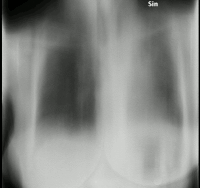
Photo from wikipedia
Background Allergic bronchopulmonary aspergillosis (ABPA) is a condition characterized by an exaggerated immune response (a hypersensitivity response) to the fungus Aspergillus (most commonly Aspergillus fumigatus). ABPA causes airway inflammation that… Click to show full abstract
Background Allergic bronchopulmonary aspergillosis (ABPA) is a condition characterized by an exaggerated immune response (a hypersensitivity response) to the fungus Aspergillus (most commonly Aspergillus fumigatus). ABPA causes airway inflammation that if left untreated can lead to bronchiectasis (an abnormal dilation of the airways) due to the immune system and fungal spores damaging sensitive lung tissues and ultimately leading to scarring. Case presentation We present a case of a 32-year-old female patient who was misdiagnosed with persistent asthma and treated accordingly for several months until a reexamination was done and a diagnosis of ABPA was concluded. Treatment was altered which led to the successful recovery of the patient. Conclusion A reevaluation of the patients’ condition was needed to arrive to the correct diagnosis and to put her on the correct treatment as an ABPA patient instead of persistent asthma, concluding that the medical history and physical examination are both of vital significance to stipulate a correct diagnosis.
Journal Title: Annals of Medicine and Surgery
Year Published: 2021
Link to full text (if available)
Share on Social Media: Sign Up to like & get
recommendations!